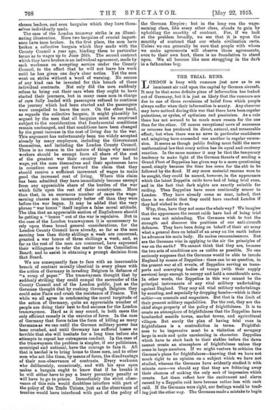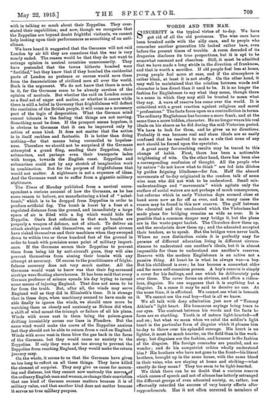THE TRIAL RUNS.
LONDON is busy with rumours just now as to an imminent air raid upon the capital by German aircraft. It may be that some definite piece of information has leaked out of Germany, but it is just as likely that the rumours are due to one of those rerulsione of belief from which people always suffer when their information is scanty. Any observer may have noticed during this war that there have been regular pulsations, or cycles, of optimism and pessimism. As a rule there has not seemed to be much more reason for the one than for the other. Of course exceptional news of successes or reverses has produced its direct, natural, and measurable effect; but when there was no news in particular confidence and misgiving have succeeded one another in regular sneces- Rion. It seems as though public feeling most fulfil the mere mathematical law that every action has its equal and contrary reaction. In the same manner it may be that the temporary tendency to make light of the German threats of sending a Grand Fleet of Zeppelins has giveaway to a more questioning mood, simply because the time has come for the ebb to be followed by the flood. If any more material reasons were to be sought, they could be named, however, in the appearance which the latest Zeppelin raids have had of being trial rune, and in the fact that dark nights are exactly suitable for raiding. Then Zeppelins have come continually nearer to London. They have already come so near, indeed, that there is no doubt that they could have reached London if they had wished to do so.
Why, then, have they not conic the whole way P We imagine that the appearance the recent raids have had of being trial runs was not misleading. The Germans wish to test the strength and discover the positions of our anti-aircraft defences. They have been doing on behalf of their air army what a general does on behalf of an army on the earth before he advances his main body. He makes reconnaissances,. But are the Germans wise in applying to the air the principles of war on the earth P We cannot think that they are, because the two sets of conditions are as unlike as possible. No one seriously supposes that the Germans would be able to invade England by means of Zeppelins a there can be no question, in the present war at all events, of Zeppelins serving as trans- ports and conveying bodies of troops (with their supply services) large enough to occupy and hold a considerable area. In other words, the Zeppelins in this war cannot be the principal instruments of any vital military undertaking against England. They may aid vital military undertakings by scouting, and especially by dropping bombs—which is their metier—on arsenals and magazines. But that is the limit of their present military capabilities. For the rest, they are the chief stage property of the policy of frightfulness. It is to create an atmosphere of frightfulness that the Zeppelins have bombarded seaside towns, market towns, and agricultural villages. But surely the plan of having trial rune in frightfulness is a contradiction in terms. Frightful- ness to be impressive must be a visitation of savagery large in scale and quite unrelenting in character. Zeppelins which have to start back to their stables before the dawn cannot create en atmosphere of frightfulness unless they come in large numbers. If we might venture to criticize the German's plans for frightfulness—knowing that we have not much right to an opinion on a subject which we have not studied, whereas the Germans have evidently studied it with minute care—we should say that they are frittering away their chances of making the only sort of impression which counts. Let them reflect how the excitement and alarm caused by a Zeppelin raid have become rather less with each raid. If the Germans were right, our feelings would be tend- ing just the other way. The Germans made a mistake to begin
with in talking so much about their Zeppelins. They over- stated their capabilities; and now, though we recognize that the Zeppelins are beyond doubt frightful visitants, we cannot help looking upon their performances as something of an anti- climax.
We have heard it suggested that the Germans will not raid London by air till they are conscious that the war is very nearly ended. The reason would be that they do not want to outrage opinion in neutral countries unnecessarily. They have pretended that the towns hitherto bombed were "fortified," but they know that if they bombed the residential parts of London no pretence or excuse would save them from the denunciations of civilized men all over the world. Such is the argument. We do not know that there is much in it, for the Germans seem to be already careless of the opinion of neutrals. But whether the raid on London comes as a final act of anger and malice, or whether it comes while there is still a belief in Germany that frightfulness will deflect the resolution of the British people, it will come as a necessary part of the logic of desperation. What the German mind cannot tolerate is the feeling that things are not moving. Something must he done. If the prospect seems hopeless, it is obvious to Germans that it can be improved only by action of some kind. It does not matter that the action is in itself reckless and fantastic. It is better than doing nothing—for that means being reconciled to hopeless- nese. Therefore we should not be surprised if the Germans attempted a grand fling, sending their Zeppelins, their submarines, and perhaps even their transports laden with troops, towards the English coast. Zeppelins and submarines could not by any stretch of imagination work in combination. But for the purpose of frightfulness that would not matter. A nightmare is not a sequence of ideas. And the Germans want us to suffer from a gigantic military nightmare.
The Times of Monday published from a neutral corre- spondent a curious account of how the Germane, as he has some reason to believe, are manufacturing a kind of " nabob bomb," which is to be dropped from Zeppelins in order to produce artificial fog. The bomb is burst by a fuse at a regulated distance from the ground, and immediately a large space of air is filled with a fog which would hide the Zeppelin. One's first reflection is that such bombs are properly a weapon of defence, not of attack. To deliver an attack airships must risk themselves, as our gallant airmen Lave risked themselves and their machines when they swooped down to within two or three hundred feet of the ground in order to bomb with precision some point of military import. mice. If the Germans screen their Zeppelins to prevent them from being hit by anti-aircraft guns, they will also prevent themselves from aiming their bombs with any attempt at accuracy. Of course to the practitioners of fright. fulness accuracy does not very much matter. All the Germans would want to know was that their fog-screened airships were floating above houses. It has been said that every German professor of science spends his day trying to invent some means of injuring England. That does not seem to be far from the truth. But, after all, the winds may serve England well as they did in Elizabeth's time. It is strange that in these days, when machinery seemed to have made us able finally to ignore the winds, we should once more be watching them as closely and anxiously as Nelson did when a shift of wind meant the triumph or failure of all his plans. Winds with some east in them bring the poison-gases drifting irresistibly across our lines in Flanders. But the same wind would make the crews of the Zeppelins anxious lest they should not be able to return from a raid on England.
Winds with some west in them blow the gas back in the faces of the Germans, but they would cause no anxiety to the Zeppelins. If only they were not too strong to prevent the Zeppelins from reaching England, they would make the return journey easy.
On the whole, it seems to us that the Germans have given ns too long to reflect on all these things. They have killed the element of surprise. They may give us cause for mourn- ing and distress, but they cannot now unsteady the nerve the ordinaryEnglisli man and woman, orcbange their conviction that one kind of German success matters because it is of military value, and that another kind does not matter because it serves no true military purpose.



































 Previous page
Previous page